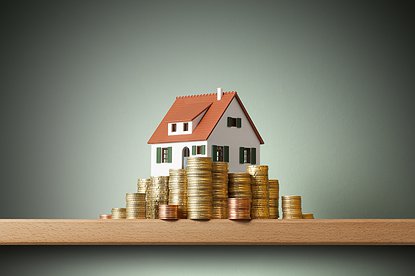Get Pre-Approved Now
Getting a Home Equity Loan with Bad Credit
Are you in need of a large loan but have bad credit?
Look no further, home equity loans may be the solution to your problem.
Not familiar? keep reading. In this article we will go into depth about what they are, how they help, and how YOU can obtain one.

What Is a Home Equity Loan?
Prior to anything, it should be known that home equity itself is the market value of the purchased residence minus the mortgage balance left unpaid.
A home equity loan, alternatively referred to as a “Second mortgage”, presents borrowers with the power to secure a loan of the same value as their current equity from a trusted lender.
As any other loan, what is lended must be repaid. During this transaction the borrower uses their home as collateral in the case of repayment failure over the course of the allotted time frame (typically 10-15 years, the upper limit being around 20).
Main Pros & Cons of Getting a Home Equity Loan
Pros:
- Fixed Interest Rates - If interest does rise, payments will not be affected.
- Lower Interest rates than most other loans/sources of credit
- Provided in one lump sum
- Money can be used for whatever is needed.
Cons:
- Shelter acts as collateral
- Closing costs and fees
- Overspending temptation
What Credit Score Do You Need to Get a Home Equity Loan?
Your credit score is often one of the major determinants (aside from factors like liabilities) examined when it comes to qualifying for a Home Equity Loan. It is a highly important variable lenders must take into account when determining the amount they are willing to lend.
A credit score is essentially a numerical representation of the creditworthiness one person possesses. This three-digit credit rating is based on the information provided by credit files. These reports analyse the rate in which debts are repaid, past payment history, time with credit and many other factors.
The higher the score, the more trustworthy of a reputation the holder carries.
In the eyes of banks and the majority of lenders, the optimal applicant for a home equity loan will generally possess a credit score of 700 or higher. However, it is still possible to attain one even if your score is between 620 and 700. Sadly, with low credit ratings there exists the downfall of consequently elevated interest rates.
Can You Get a Home Equity Loan with Poor Credit?
This topic is actually quite a common concern among borrowers; especially for those in possession of bad credit due to past late payments and debt.
It is perfectly understandable to be stressed when placed in a situation where your credit is low yet the need for money is high. A bad credit score can eliminate your chances of obtaining other loans but this is not always the case when borrowing against the value of your residence.
To obtain a home equity loan there are some standards that one should try to meet:
- Minimum credit score of 620 or higher depending on the loaner
- Stable job
- Steady income
- Debt-to-income ratio of less than 43% (the maximum may be higher since rates can vary according to the lender)
- Favorable on-time payment history
Fear not, even if your credit does not meet expectations this will not necessarily equal to rejection. While some lenders remain inflexible on their stance, others will compromise and look to other compensating factors (i.e DTI, equity amount, employment type...).
The less debt you face, the more equity you possess, and the security of your job are all facets that can help recompense for your lack of credit.
Can You Get a Home Equity Loan if You’re Unemployed?
Without a job or any sort of employment obtaining a home equity loan will be a challenge.
To persuade a lender, documentation of unemployment income and other sources of revenue are needed. If you are without any sources of income a co-signer will be required and your chances of approval will be lowered.
Without a job, the rest of your application should remain top-notch. In other words, you will need a high credit score, little debt, and a relatively large amount of equity (preferably without other liens attached).
*Remember, a loan is like a gamble to the loaner. If they are doubting the borrower’s ability to repay it, they will opt out.*
How Much Home Equity You Need to Qualify for a Loan?
As previously mentioned, to calculate your home equity you must subtract the remaining of your unpaid mortgage from the value of your current residence.
To secure an advance, your loan-to-value ratio is required to be a maximum of 80% or less after the money is lent. This denotes that you will need to own at least 20% equity of your current home. This percentage is commonly determined by an appraiser.
The loan-to-value ratio is calculated by dividing the borrowed amount in dollars by the value of the asset. The decimal figure is then multiplied by 100 to represent it as a percentage.
For instance; imagine a residence has been freshly appraised with a worth of $100,000.
You decide to purchase it and therefore make a down-payment of $30,000 using the money already in your account.
At this point you have purchased 30% home equity ($30,000 / $100,000 x 100 = 30% ) .
To pay off the rest of the mortgage, you decide to borrow the remaining $70,000 from the bank.
The loan-to-value ratio in this particular case will end up being 70 percent;
$70,000 divided by $100,000 is equal to 0.70 in decimals, translating to 70% once converted to a percentage.
If by chance you do not own 20% or are on the lower end of the range, there are two main ways the amount of equity in your possession could be raised.
- Paying off the rest of your mortgage
- The market value of your home increases
How to Improve Your Chances of Being Qualified for Home Equity Loan?
Lessen your loan-to-value ratio - As previously mentioned, your loan-to-value ratio is the quotient between the quantity of money borrowed and the unpaid value of the asset. The ratio after acquiring a loan is required to be a MAXIMUM of 80%. The lower it is, the better chance your request will be approved. How do you lessen this value? Simply increase the amount of home equity under your name by paying off the mortgage or increasing your home’s market value.
Decrease your Debt-To-Income Ratio - Your Debt-To-Income ratio (a.k.a your DTI) is a factor viewed in high regard by lenders. It is typically represented in the form of a percentage and is calculated by dividing a person’s monthly bills (including the future loan!) by their gross monthly income. The lower the result, the more trustworthy you appear to loaners.
This ratio is especially crucial to those suffering from bad credit. If low, it can be considered as a redeeming quality since it will suggest a lower risk to the lender. According to the industry standard, the ideal candidate would have a Debt-To-Income ratio of no more than 43% - preferably less.
If you find your DTI to be on the higher end of the scale, do not worry there are a few methods to lower it faster;
- Increase the amount of money allocated to paying your debts on a monthly basis.
- Avoid taking on new debt for the time being.
- Strive and put in the effort to increase your income and sources of revenue.
Raise your Credit Score - This one goes without saying. Pay your monthly installments on time and avoid overspending!
Research suitable lenders - Take advantage of a lenders Network. Not all lenders have the same mindset or ressources. Some banks immediately turn down anyone with credit below 700, while other smaller institutes may look to compromise.
Smart Ways to Use Your Home Equity
1. Investment - Investing in other properties and stocks with the help of a home equity loan is something many owners do in hopes of making a greater return. If done correctly and wisely, this is certainly a smart way to use a portion of the granted money. However, this does carry about some major risks considering the Stock and Real Estate markets are extremely volatile and unpredictable.
2. Education Funding - Why not settle for a simple student loan in this case? Well, the interest rate of a home equity loan can sometimes be lower than that of a student loan. In addition to this, it may be easier to gain approval to a home equity loan with bad credit than a student loan. This being said, rates do vary and it is different depending on the loaners.
3. Debt Consolidation - When deep in debt, it can be hard not to lose hope in our financial lives. A home equity loan is a viable and useful option that can merge all of your debts into one. You will be left with a single monthly payment, lower than the sum of all the previous debts. Yes, freedom of debt is possible.
4. Home Renovation - A home is probably the most used and valuable asset one can own in a lifetime. It only makes sense since it is the main place of comfort you end up returning to day-after-day. A house on the market can sell for a lot, but it can sell for even more when it is maintained in peak condition and improved. This is where home renovation comes in. Not only will the residents feel more satisfied and content with the new modifications, they will also help increase the market value of the building; this perk will in turn raise the amount of equity in your possession. What could be better than spending money to earn more and ameliorate your quality of life?
What are Other Loan Alternatives If I Have Bad Credit?
One other popular loan alternative for those with bad credit is a home equity line of credit, otherwise known as “HELOC”. It is a loan with a draw period and a repayment period. The advance taps into your home equity and then lends borrowers up to a certain amount of money. One can access this money whenever they wish by using different means such as writing a check, using a credit card...
Using a HELOC’s you will have to face a draw period and a repayment period. The draw period is usually around 5-10 years and the repayment time is anywhere from 10 - 20 years. During the former, you can withdraw as much money as needed from the given allowance, only paying interest as required. Throughout the repayment period, all the money taken out of the account must be given back to the lender.
Advantages
- Unlike a home equity loan, a HELOC is set up as a line so you can withdraw as much as needed instead of having to use all of the allotted sum. This perk helps control or limit overspending temptation.
- Interest is a lot lower than other types of credits or home equity loans. At the beginning of 2019, home equity loan rates averaged near 8.75% while annual HELOC rates averaged at around 5.5%. That is a 3.25% difference.
- Convenient access to available credit. Along the line if you find yourself in need of paying for education, home renovation and/or anything else, the credit is easily accessible and may prove to be extremely helpful.
Disadvantages
- Volatile interest rates - Your monthly payments may end up increasing if any changes in interest rates occur.
- Home is used as collateral in the case of default.
Summary
In conclusion, while a home equity loan does present some risk and may appear scary, it also holds some advantages that may appeal to homeowners with both good and bad credit.
If you or someone you know is interested in acquiring a loan or need help making informed decisions, do not hesitate to contact us at Mortgage Central Nationwide.
We pride ourselves in helping our clients attain their goals effectively using our wide variety of financial services, whether it be private loans, second mortgages, or debt consolidation.



